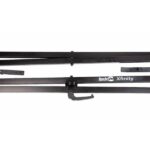Picture this scenario: you’re playing your favorite musical instrument, the flute, and you are expecting a crisp and clear melody.

However, you’re met with an awkward, airy sound that just doesn’t seem right. I know; that can be frustrating.
If you can relate to that scenario, don’t worry because all hope is not lost. In this step-by-step guide, we will explore the common causes of airy flute sounds.
We will also consider what to do if your flute sounds airy. Together, let’s reclaim the melodious beauty of your flute!
Contents
Possible Causes of Airy Flute Sound
Before we start this journey of troubleshooting an airy flute sound, it is only wise to take a moment and figure out why a simple musical instrument like the flute can produce an airy sound.
Three key factors could be causing an airy flute sound.
They are:
- Leaky flute mechanism
- Embouchure technique
- Blockages in the air pathway
As you learn more about these possible causes, it will be easier to understand the recommended solutions, and you will be ready to tackle the problem.
So, without any further ado, let’s shed more light on these three culprits.
Leaky Flute Mechanism
The flute has a few delicate mechanisms that help to produce crisp sounds. However, these mechanisms can develop small gaps or leaks over time.
As these leaks develop, they can disrupt the smooth flow of air and consequently lead to an airy sound.
That is why manufacturers and experts recommend that it is important to carefully inspect your flute from time to time for any visible signs of leaks.
Such signs may include worn-out cork or loose pads. Early detection can help you address these issues in time and preserve your flute’s beauty and airtight characteristics.
However, if it has already happened that your flute’s sound mechanism is already leaking, continue reading to find out how to solve the problem.
Embouchure Technique
Simply put, the embouchure technique refers to how you position your lips and blow air into the flute’s mouthpiece.
Of course, not everyone that plays the flute is a professional; and that means not everyone playing the flute knows the proper method of blowing air into the flute.
However, the embouchure technique plays a crucial role in producing a crisp, clear, and resonant sound.
If your embouchure is incorrect, the sound coming out of your flute will sound awkward and airy.
In some cases, it has become necessary for musicians to take flute classes, not because they can’t play, but because they need to get a mastery of the embouchure technique.
Blockages in the Air Pathway

Because flutes are intricately designed, they are prone to blockages that disrupt or impede the smooth flow of air.
Over time, specks of dust, debris, and other small particles can find their way into the flute and obstruct the air pathway. This is one of the leading causes of airy flute sound.
The blockage may also be a result of too much saliva from the mouth of the player. Saliva and other particles from the mouth can obstruct the air pathway.
If the flute is left unattended to and in the care of kids and toddlers, they can mess with it, leading to blockage in the air pathway.
Taking these three primary causes into consideration – leaks in the flute mechanism, wrong embouchure technique, and blockages in the flute’s air pathway – we now believe that you know how to identify the specific issues that might cause your flute to sound airy.
What to Do If Your Flute Sounds Airy
As you go through these DIY solutions, always remember that you need patience and perseverance.
These two qualities are crucial as you work through the troubleshooting process.
So, the next time your flute sounds airy, these are some troubleshooting options available:
Step 1: Inspect the Flute
Physically inspect the flute for any visible leaks, gaps, or misaligned keys. Remember, gaps and leaks can impede the flow of air, thus resulting in an airy sound.
Carefully inspect the body of the flute as well as the key mechanism. Don’t rush through this process. Check for any sign of loose screws, misalignment, or wear.
Once you have identified the problem or what it could be, move on to the next step.
Step 2: Correcting Mechanical Issues
After identifying any mechanical problems like misaligned keys, or loose screws, the next thing to do is adjust any discrepancies.
You may consult the manufacturer’s manual for instructions on how to properly adjusts these mechanisms.
You can also do some research on how to tighten loose screws and realign misaligned keys.
However, some complex mechanical problems may require that you contact a professional repairer.
So, when you notice that you need professional help, don’t hesitate to seek expert assistance.
Step 3: Refine Your Embouchure Technique
Do you remember the embouchure technique mentioned as one of the causes of this problem at the outset?
After implementing steps 1 and 2, what if the airy sounds persist? Then, it is time to adjust your embouchure technique.
Take some time to evaluate your embouchure technique.
Ask yourself: Am I positioning my lips correctly? Am I maintaining proper breath control?
You can get helpful tips and techniques to improve your embouchure and enhance the quality of your sound.
Step 4: Clearing Air Pathway Blockages
As highlighted above, blockages in the flute’s air pathway can also cause an airy sound. It’s time to disassemble your flute and give it a thorough cleaning.
A word of caution: Be sure to familiarize yourself with the proper way to dissemble your flute.
Then, safely clean the head joint, body, and foot joint to remove any debris or blockages. Remember, a clean flute is a happy flute!
Step 5: Testing and Adjusting

Finally, after following through on each of these steps, the final thing is to test the sound of your flute.
Try playing a few notes and listening carefully to figure out if the airy sound has reduced or is gone.
Based on the outcome of your test, you may need to repeat some steps if necessary. On the other hand, your flute may now be in perfect condition.
General Maintenance of Flutes
Regularly cleaning your flute is the most important maintenance you can give it. During each cleaning session, pay careful attention to the head joint, body, and keys.
If you can find any, use a cleaning rod, soft cloth, or any specialized cleaning brushes to remove obstructions that could cause blockage.
This will ensure that your flute maintains a clear passage for air to flow through.
Don’t wait until your flute develops a fault before you decide to clean it. To help you achieve this, you may schedule the cleaning at regular intervals.
You can maintain its optimal performance and prevent airy sound issues by keeping your flute clean and free from blockages.
Key Point
If you’ve ever experienced this frustrating problem with your flute, we are confident that you now understand what to do if your flute sounds airy.
Instead of tossing it away and concluding its bad, carefully follow the steps outlined in this article and reclaim the sweet melody of your flute!






